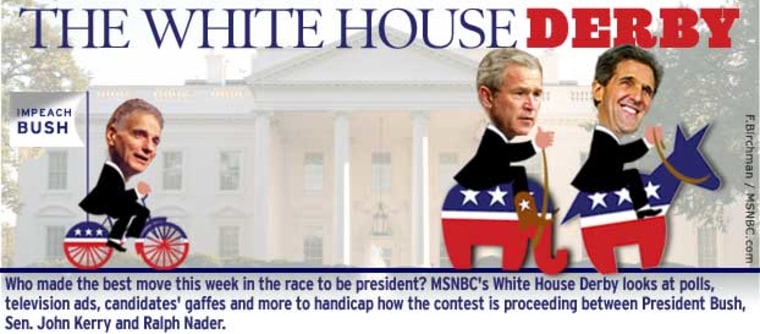The abrupt resignation of CIA Director George Tenet tells us once again that this will be an election year at the mercy of unexpected events.
Polls and focus groups are only of limited use if the drumbeat of events keeps grabbing voters’ attention.
“He gave no indication whatsoever that he was pressured in his decision to resign,” said Senate Armed Services Committee chairman Sen. John Warner, R-Va. Pressured or not, has Tenet provided a useful service to candidate Bush by quitting?
Tenet’s exit was the second time in a week that outside events overshadowed the presidential horse race.
The Justice Department’s release of new information about alleged “dirty bomb” al-Qaida agent Jose Padilla shows that the president and his advisers retain a big advantage in the presidential race: the ability to influence the agenda, to focus voters and the news media on stories that the Bush administration thinks are important.
Just as the Supreme Court played a leading role in the 2000 election, the justices may affect the outcome this year.
If, for example the justices rule against the Bush administration in three cases which will decided before the end of June — the Padilla case; that of Yaser Hamdi, who was captured on the battlefield in Afghanistan and who, like Padilla, has U.S. citizenship; and the case of the Guantanamo detainees — will it turn public opinion against President Bush’s war on terrorists or redouble pubic resolve and support for Bush?
Another big Supreme Court decision is pending before June 28: lawyer Michael Newdow’s bid to effectively remove the words “under God” from the Pledge of Allegiance.
When the federal appeals court in California supported Newdow by ruling that school children’s recitals of the pledge that include “under God” violate the First Amendment, the public reaction went vehemently against the judges and for the words “under God.”
A win for Newdow could also be a win for Bush by motivating voters angry about what they’d see as excessive judicial legerdemain.
Meanwhile on the campaign trail, yes, Virginia there is a Democratic presidential candidate and to prove it, he is running television advertising in your state.
“A gesture of strength," Mary Beth Cahill, Kerry's campaign manager, called the ad buy in Virginia.
The last Democratic presidential candidate to carry Virginia was Lyndon Johnson in the landslide year of 1964.
In each of the nine presidential elections since then, the average Republican margin of victory in Virginia has been nearly 260,000 votes. Despite the seemingly long odds, Cahill is pursuing the tactic of trying to sow doubt in the minds of her adversaries.
And Kerry’s impressive fund-raising in the past two months allows him the freedom to make such feints and jabs.
Making its own jabs, the Bush campaign hit Kerry for missing a Senate roll call vote Wednesday night on approving $25 billion to pay for operations in Iraq.
Kerry’s presence wasn’t vital to the outcome: The measure passed, 95 to zero.
Nonetheless, Bush-Cheney '04 Campaign Chairman Mark Racicot said, “John Kerry's decision to spend yesterday delivering an attack speech rather than returning to the Senate to support the troops shows his purely political approach to foreign policy.”
Kerry remains slightly ahead in the White House Derby mostly due to Bush’s weakness compared to other wartime presidents (Richard Nixon, Franklin Roosevelt) at this point in their re-election campaigns.
The employment data released Friday brought encouraging news for Bush. The Bureau of Labor Statistics reported that payroll employment jumped by 248,000 in May. Since its recent low last August, employment has risen by 1.4 million, with two-thirds of that increase coming in the last three months. Total employment was 138.8 million in May, with 8.2 million seeking work.
